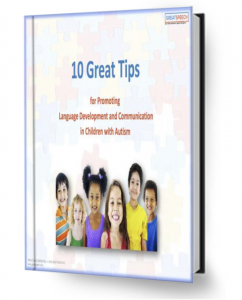Autism eBook

WHAT IS ASPERGER’S SYNDROME?
Asperger’s Syndrome refers to a type of pervasive developmental disorder involving atypical characteristics within the development of many basic skills, most notably the ability to socialize with others, communicate, and use imagination.
Although Asperger’s syndrome is similar in some ways to autism, it is important to note that Asperger’s syndrome is not typically as severe as autism and there are some important differences.
Children with Asperger’s syndrome tend to function at higher levels, have normal intelligence, and near normal speech development when compared to children with autism, though many develop problems with communicating, both verbally and non-verbally, as they grow older.
WHAT ARE SIGNS OF ASPERGER’S SYNDROME?
Like with all syndromes, symptoms of Asperger’s syndrome vary from individual to individual and can range from mild to severe. Common symptoms include:
- Problems with social skills: Children with Asperger’s syndrome generally have difficulty interacting with others and are often awkward in social situations. They generally do not make friends easily and have difficulty initiating and maintaining conversation.
- Eccentric or repetitive behaviors: Children with this condition may develop atypical, repetitive movements, such as hand wringing or finger twisting.
- Unusual preoccupations or rituals: A child with Asperger’s syndrome may develop rituals that he or she refuses to alter, such as getting dressed in a specific order.
- Communication difficulties: People with Asperger’s syndrome may lack the ability to make eye contact when speaking with someone. They may have trouble using facial expressions and gestures, and understanding body language. They may also have problems understanding language in context.
- Limited range of interests: A child with Asperger’s syndrome may develop an intense, almost obsessive, interest in a specific areas, such as sports schedules, weather, or maps.
- Coordination problems: The physical movements of children with Asperger’s syndrome may seem clumsy or awkward.
- Skilled or talented: Many children with Asperger’s syndrome are exceptionally talented or skilled in a particular area, such as music or math.
ONLINE SPEECH THERAPY FOR SELF REGULATION
This program is designed to help tweens, teens and college students empower them to improve their communication skills.
Program Highlights Include:
- Give an understanding that all feeling are normal and a part of life
- Introducing the zones approach to better regulate feelings
- Introducing a variety of strategies/tools to help regulate their emotions
- Practice calming techniques to help manage emotions
- Learn and understand thinking a variety of thinking strategies to help manage emotions (big vs. little problem eg.)
How Can Great Speech Help?
Speech and nonverbal communication as well as social interaction are the most common problems for individuals diagnosed with ASD which is why speech-language therapy is a central part of treatment.
Speech therapy for individuals on the spectrum is designed to coordinate the mechanics of speech with the meaning and social use of language. Based on the results of our assessment, a specially trained Great Speech therapist, will set goals specifically designed to help your child communicate in the most functional and socially-appropriate way, including mastering spoken language or learning non-verbal communication skills.
Are you ready to begin online speech therapy? Click here to get started today!
Social Groups
This program is designed to help children and teens and college students develop essential pragmatic skills to become successful adults.
Learn more about how social communication is using language in a social context.
Program Highlights Include:
- Emotional management and understanding the emotions of others
- Friendship: Being a good friend, apologizing to friends and interacting through social media
- Peer pressure
- Bullying and Teasing
- Conversational skills (topic maintenance, compromising, group conversation rules)
Intensive Program Frequency of Services Recommended:
This individualized program entails a high intensity approach (much like a bootcamp), offered for two sessions per week for 30-minutes each, for 6 weeks. One session will be individual with the assigned therapist, the second session will be two clients with their same assigned therapist to ensure carry-over of skills.
Are you ready to begin online speech therapy? Click here to get started today!

